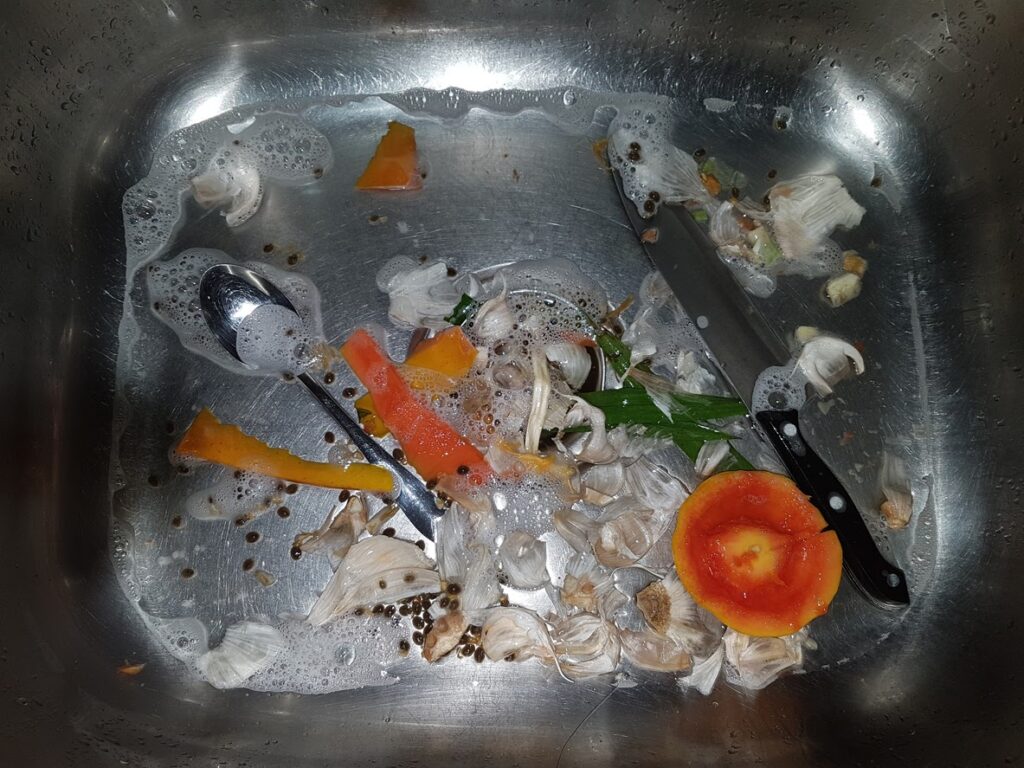A garbage disposal can make cleaning up after meals a whole lot easier. Instead of constantly unblocking your drain or having to worry about sneaky pieces of food making their way into your pipes, a garbage disposal does the hard work for you—it grinds up food waste, allowing scraps to easily flow through your pipes and out to the sewer.
More waste that goes out to the sewer means less waste that’s stinking up your trash can.
It’s common knowledge not to put things like cooking utensils, plasticware and bottle caps down the garbage disposal, but did you know that there’s a long list of things you should never put down your garbage disposal?
We have a list of food items that can cause havoc on your disposal and plumbing below, but first, let’s talk about how garbage disposals work.
How Does a Garbage Disposal Work?

A big misconception is that garbage disposals work like blenders—that the blades are spinning around, chopping up food into little pieces. However, if you ever take a peek inside of a garbage disposal, you’ll notice that’s not exactly how they work.
Instead, your garbage disposal relies on heavy metal lugs that have been mounted on a spinning plate.
As the lugs spin, the garbage disposal creates centrifugal force, grinding the food particles against a grind ring until they’re essentially liquefied. Once they’ve been ground to bits, water helps flush out the particles and carry the waste down the drain.
Okay, now that you know how a garbage disposal works, here is a list of things you should never put through it.
1. Fats, Oils and Grease
When you’re cooking, heat causes fat, oil and grease to liquify.
Once removed from the heat, these substances begin hardening as they cool.
Unfortunately, your garbage disposal can’t do anything to break down fats, oils and greases when you dump them into the drain.
These substances instead slide through the machine and into your pipes. As they travel down your pipes, they cool and eventually solidify, sticking to the sides of the pipes.
This can cause plumbing problems, including slow-moving drains and blockages.
2. Coffee Grounds
Your garbage disposal won’t have any trouble processing coffee grounds. However, your plumbing might, especially in an older home.
As coffee grounds pass through your drains, they tend to clump together and create clogs and your garbage disposal won’t be able to do anything else to help break down the coffee grounds. They’ll clump together in the pipes no matter how big or small.
3. Bones
Remember, your garbage disposal isn’t a tiny ninja that can pulverize whatever you throw down the drain. Typically, bones are too large and too hard to be broken up by the average garbage disposal.
Most likely, the bones will spin around while making a crazy noise in the garbage disposal forever and never make it down the drain.
It’s best to toss them in the trash when you’re cleaning up after a meal.
4. Fruit Pits
Pieces of leftover fruit shouldn’t be a problem for your garbage disposal, but it’s better to chuck the pits in the garbage.
Generally, fruit pits are too large and too hard to be broken up by the average garbage disposal.
More than likely, the pit will just rattle around inside the disposal and potentially damage the lugs inside preventing them from properly breaking up food particles.
5. Pasta, Rice and Oatmeal
In small quantities, these foods shouldn’t be too much trouble for your garbage disposal. They’ll simply get spun to small particles and flow down the drain.
The problem with these foods occurs when you dump large quantities into the garbage disposal or let them sit in the garbage disposal for an extended time. Pasta, rice and oatmeal absorb water, which can turn into a gummy, sticky mess. The buildup can cause the lugs to seize inside of your garbage disposal and prevent it from spinning.
6. Corn Husks, Potato Peels and Fibrous Vegetables

Similar to pasta or oatmeal, small pieces of these vegetables should be ok for your garbage disposal to process.
However, in larger quantities, the fibers in peels and vegetables like celery and some squashes can get tangled up in the garbage disposal, preventing it from spinning around.
You’re better off composting these items instead of trying to wash them down the drain—your pipes and the environment will thank you.
Are You Having Garbage Disposal Trouble?
Whether you’re having trouble with your existing garbage disposal or if you’re looking to add one to your kitchen, Althoff Industries can help.
Our experts are here to help with your plumbing maintenance, repair and installation needs. Give us a call at 815-345-2778 to schedule an estimate today.
